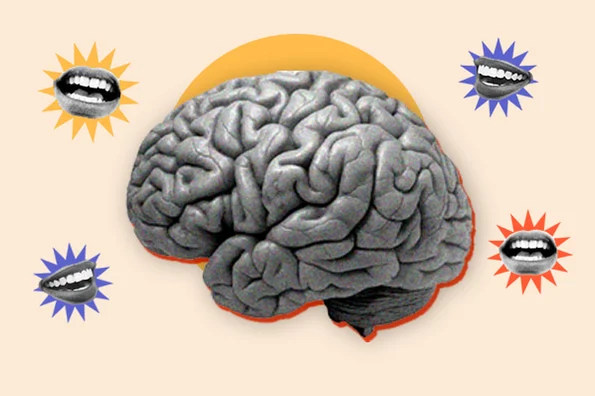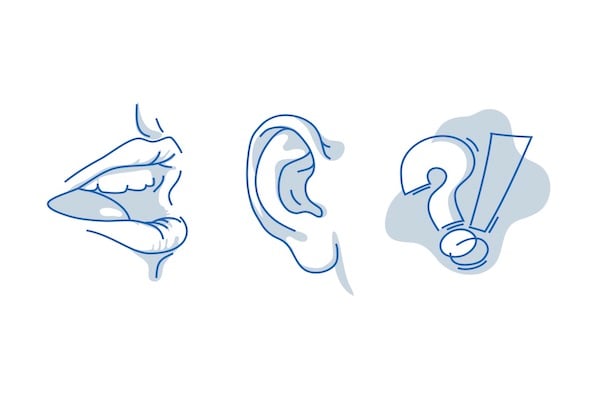Personality tests are a great way to explore different aspects of who you are and uncover layers you perhaps hadn't recognized about yourself before.
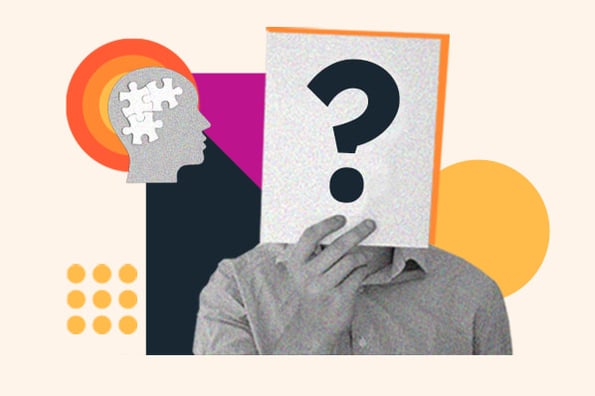
Keep reading to learn more about the purpose of taking personality tests. Then, take a look at the best free personality tests we've compiled and discover aspects of who you are, why you make certain decisions, and more.
The Purpose of Personality Tests
Being truly self-aware is hard. While personality tests might not always be 100% accurate, they work well as a starting point for self-discovery by providing results you might not have concluded on your own. These insights are invaluable for one's personal and professional growth.
Pros of Personality Tests
Personality tests can be used for self-reflection and help you gain better insight on how to play to your strengths and combat your weaknesses.
Personality tests are also widely used in the workplace because they can be a great way for you and your coworkers to better understand each other's communication and collaboration styles.
These tests are great conversation starters, especially among groups of people who don't know each other very well. They can help create connections and establish common ground at work.
Learning about your colleagues' personality traits can reveal how each team member prefers to receive feedback and criticism. This can help your team avoid unnecessary miscommunication down the road, as well as lead to more productive projects and meetings.
.png)
Company Culture Code Template
Establish an inclusive organization with our free Company Culture Code Template. Outline your...
- Culture code.
- Company mission & values.
- Company policies.
- And more!
Cons of Personality Tests
While there are many pros to taking personality tests, there are also some cons.
Test results can be vague, depending on which test you are taking. Shorter personality tests, though convenient, are often not as comprehensive and accurate as the longer tests. Plus, some tests require a higher level of self-awareness and understanding of how others perceive you — not having this understanding may skew your test results.
Now, let's learn more about the different types of personality tests, so you can determine which one is right for you.
Types of Personality Tests
With so many personality tests to choose from, it can be difficult to narrow down which one is right for you. Some focus on assessing your communication style, while others may look at your emotional intelligence, behavior, and more. Here, we've compiled a list of common types of personality tests you can take for free online.
1. Myers-Briggs Personality Tests
Myers-Briggs is a widely respected and popular personality assessment tool — first used in the 1940s, the test was developed by Katharine Cook Briggs and her daughter, Isabel Briggs Myers. Initially inspired by Carl Jung's personality theory, the Myers-Briggs test conveniently separates people into 16 categories of personalities, providing each person with a four-letter acronym.
The following four tests are broad-stroke indicators of who you are, using inspiration from Myers-Briggs. Among other things, the tests cover your communication styles, your strengths and weaknesses, your desires and ambitions, how you see the world, and how people perceive you.
If you've never taken a test based on Jung's psychological traits, or Myers-Briggs' 16 categories of personalities, you may be surprised by the accuracy of some of the statements. More importantly, you could gain insight into how your behavior is perceived by others, helping you improve both professional and personal relationships.
2. DISC Personality Tests
The DISC assessment determines where you lie on four DISC factors: dominance, influence, steadiness, and compliance. DISC is one of the most popular and authoritative career assessments out there, and many companies encourage their employees to take it.
Undoubtedly, personality affects our career ambitions, as well as how we perform in different workplace environments. If you're particularly extraverted, maybe you've chosen a career path that enables you to work daily with large groups of people. If you have certain communication styles that rely on passivity and emotion, perhaps your boss's direct statements sometimes offend you.
Arming yourself with a sense of self-awareness could help you find your optimal career path, foster better work relationships, and mitigate work conflict more effectively.
3. Emotional Intelligence Tests
Psychology Today defines emotional intelligence as, "the ability to identify and manage your own emotions and the emotions of others." Arguably, having emotional intelligence is the most important factor in dealing with conflict and communicating with others.
It's undeniable that emotional intelligence is important — in fact, research has shown success is 80-90% attributable to emotional intelligence (EI), and only 10-20% to your IQ.
In the workplace, whether you're around coworkers in the midst of a stressful project, or dealing with a tough performance review from your boss, it's critical you know how to both figure out and handle your own emotions; it's equally important you know how to read other people's emotions and manage them appropriately.
Ready to get started? Take a look at the curated selection of free personality tests below, and start learning about yourself today.
Free Personality Tests
1. 16 Personalities
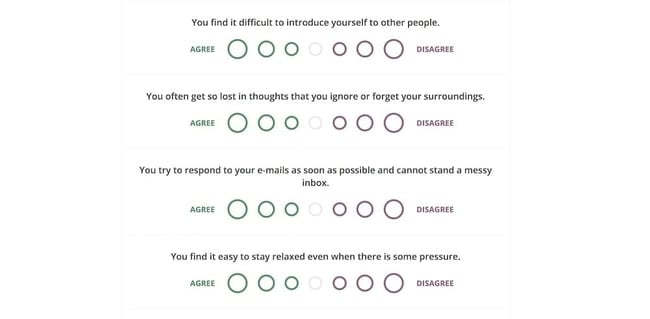
Best for: Learning how your personality type influences many different areas of your life, as well as how it impacts your relationships.
16 Personalities covers five broad personality aspects: mind, energy, nature, tactics, and identity. The test is based on Carl Jung's study of psychological traits ( like extroversion vs. introversion) and the Myers-Briggs test, two popular personality theories meant to determine an extensive overview of who you are.
Among other things, the test will cover how you communicate and relate to others — both professionally and personally — what you value and strive for, and how you make decisions. 16 Personalities has been taken over 126 million times and is available in 30 languages.
Pros: Once you've gotten your results, you'll find extensive information on your personality type including strengths and weaknesses, relationships, friendships, parenthood, and workplace habits. The test is incredibly accurate and can tell you how your personality type plays out in specific situations.
Cons: With seven bubbles varying from "Agree" to "Disagree", it can be difficult and time-consuming to figure out where exactly you fall on each question. A "Strongly Agree," "Agree," "Neutral," "Disagree," and "Strongly Disagree" chart might've been easier to answer.
2. Personality Perfect
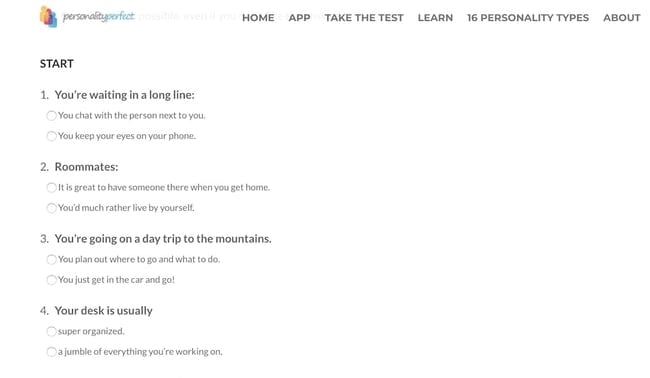
Best for: Learning how others perceive you or how they might misinterpret your behaviors, and finding out what you value most.
Similar to 16 Personalities, Personality Perfect is also based on Jung's and Myers-Briggs' personality theories, and uses four broad categories — extraversion vs. introversion, sensing and intuition, thinking and feeling, and judging and perceiving — to compile a four-letter abbreviation of your personality type (like "INFP").
The test offers a broad overview of how you connect with others, how you behave, and, perhaps most surprising, how you're likely seen by others.
.png)
Company Culture Code Template
Establish an inclusive organization with our free Company Culture Code Template. Outline your...
- Culture code.
- Company mission & values.
- Company policies.
- And more!
Pros: Once you know your four-letter personality abbreviation, you can apply that label to various situations, like work and love, and figure out how others perceive your behaviors in those settings.
Cons: Tests that are based on Jungian personality theories are typically considered rough tendencies, and not strict classifications — and many researchers say Myers-Briggs tests are unscientific due to the different results you might get if you take the test twice.
3. TestColor
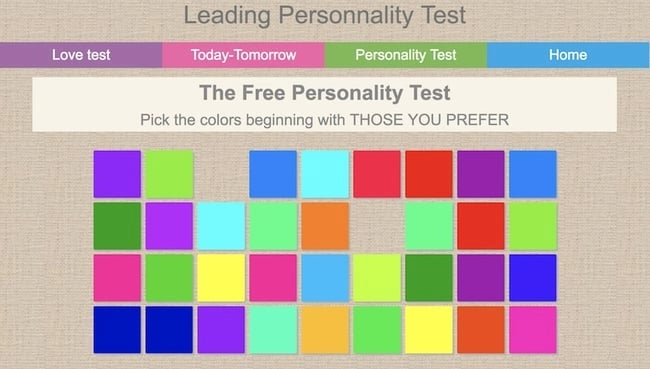
Best for: Finding out the ratio of extroverted to introverted you are, plus getting short descriptions of the qualities that most characterize your personality.
Test Color, a test validated by a team of clinical psychologists, psychoanalysts, and mathematicians, asks you just two questions: "Click on the colors you like most," and "Click on the colors you like least."
Test Color tells you about your emotional intelligence, your creativity and imagination, your social skills, and your work style, including organization and management styles. I found it to be surprisingly accurate: in two questions, it nailed how I communicate with others and how I act in group settings.
Pros: It's incredibly quick and easy — taking roughly 5 minutes to complete.
Cons: The results are relatively vague and general, and the test doesn't divide your personality into categories depending on the situation. (For instance, it doesn't tell you the difference between your personality in work settings and romantic situations.)
4. Interpersonal Skills Assessment
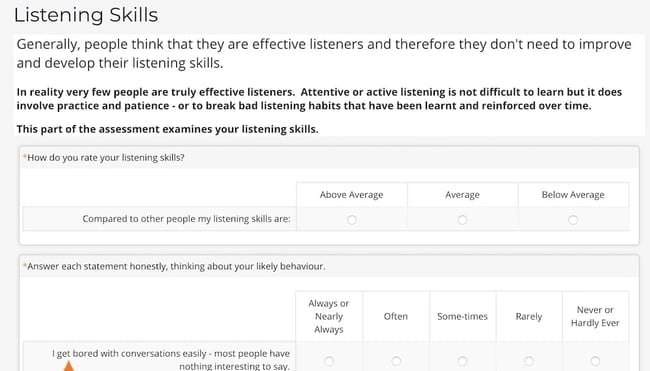
Best for: Improving your communication and listening skills.
Having well-developed interpersonal skills is critical to forming deep and meaningful personal and professional relationships. Interpersonal Skills assesses your listening skills, verbal communication skills, ability to work in teams, and emotional intelligence.
Better yet, the test identifies areas of weakness and provides tactical advice on how to improve those skills.
Pros: After you've completed the test, Interpersonal Skills provides you with helpful resources to level-up your communication or listening skills. Resources include "An Introduction to Communication Skills" and "Advanced Communication Skills" ($13 each). And even without the resources, this is a quick and easy test for evaluating areas for improvement in your own communication style.
Cons: To evaluate your listening skills, you might need to ask other people how they perceive you. Maybe you think you're a good listener, but others disagree — if that's the case, it can be difficult to accurately self-analyze your own skills for this test (or any others).
5. Big 5 Personality Test
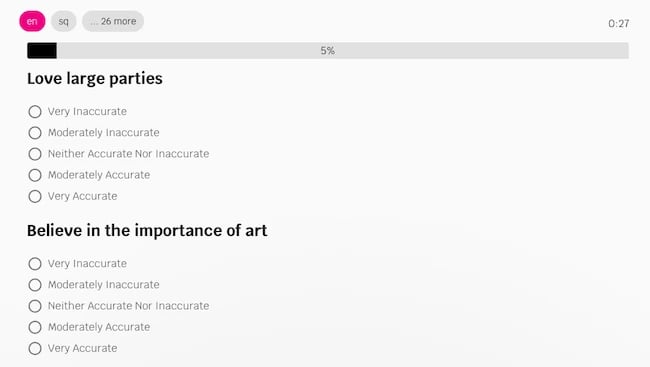
Best for: Evaluating your self-awareness and how you relate to other people.
The Big Five personality test is relatively quick to complete and the results are comprehensive and interesting. It offers useful sections for self-awareness in and outside of the workplace.
Whether you’re rational or spontaneous, imaginative or outgoing, this detailed report makes each section and score clear, useful, and interesting. Plus, it includes graphics that can help you understand your results and see how different personality qualities connect.
Pros: This test is useful for getting a better understanding of yourself and how you might be perceived by others. There's also a section where you can compare your results with friends or a group of people on your team who have also taken this test.
Cons: While the "Big 5" chart is useful at a glance, more context and details on the methods and ideas behind this test would be helpful. A more detailed explanation of scoring beyond high vs. low would also be a value-add.
6. Enneagram
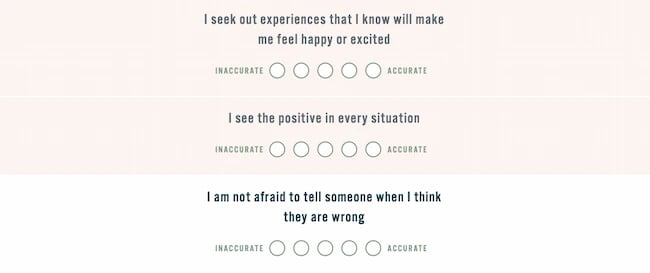
Best for: Learning about how you are motivated and how your personality impacts your relationships.
In this test, your results will give you a number that describes your personality type. Then, you might also look into your "wings" for extra insights.
Enneagram tests are so popular that there are many different versions of this test online. In fact, this test is so present in pop culture that there are many interesting ways to engage with your type — from music to Facebook groups.
Pros: This is an efficient and insightful personality test. It also emphasizes that you have the final say in your type, meaning that if your self-perception contradicts the type in your results, you should go with the type that feels most authentic to you.
Cons: There are many different interpretations of each type online. This means that you may read one interpretation of your enneagram type that feels off-putting and another that feels aligned. This can make your results feel less trustworthy than some other tests.
7. True Colours Test
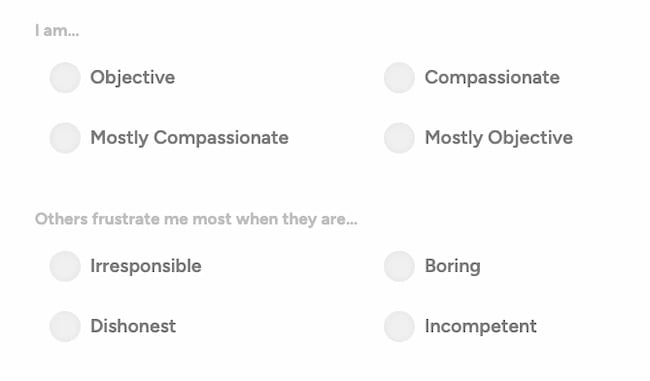
Best for: Getting a new perspective of how others see you and how you see yourself.
This test ranks responses in groups of four. When answers are binary, like objective vs. compassionate, there are also options to answer mostly objective or mostly compassionate. This is a nice change from tests that offer more strict answer options.
Then, it groups results by color and uses orange, gold, blue, and green to represent four different personality types. It also includes a paragraph with details on what your results mean.
Pros: Questions for this test are unique, flexible, and interesting to answer. This test is a great jumping-off point for further self-analysis.
Cons: Results are useful, but very broad, so you may want to research your results further.
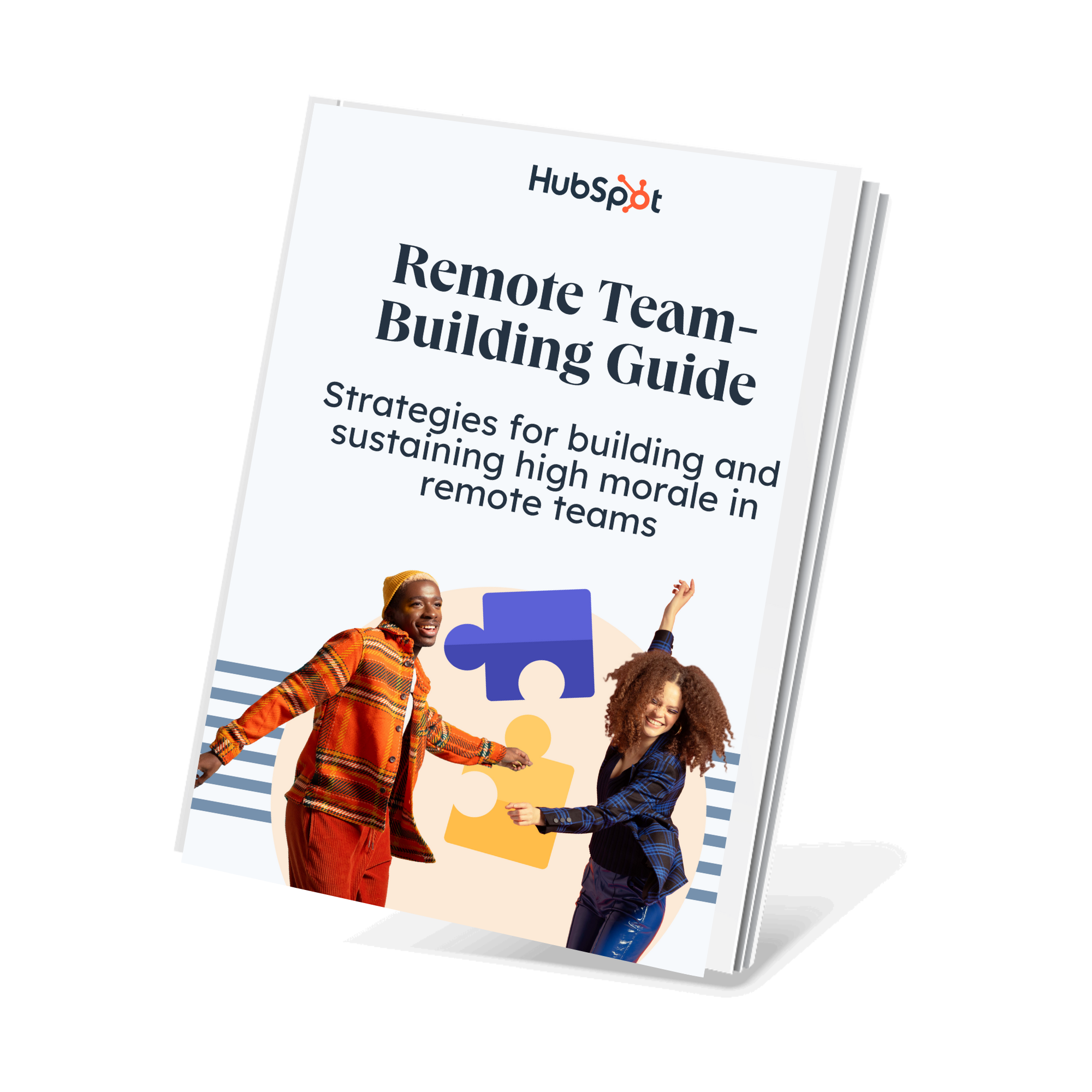
50+ Remote Team-Building Ideas
Tips, tricks, and templates to help you master team-building in the age of the remote workforce.
- Boost team morale
- Ice breaker games
- Activity proposal template
- And More!
8. Berkeley Emotional Intelligence
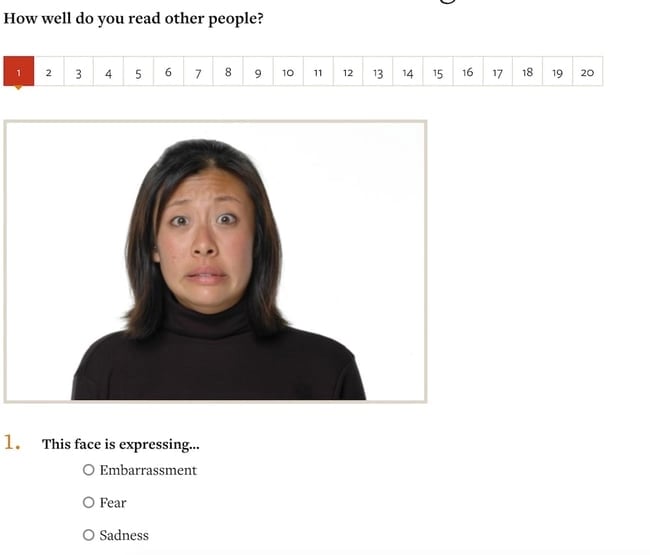
Best for: Figuring out how well you analyze and interpret other people's emotions — a vital component of strong emotional intelligence.
This test, designed by Berkeley, shows you 20 pictures and asks you to recognize the facial expression on each person's face. It's easy, quick, and fun, and an informative way to learn how well you read other people's emotions — which is a critical skill for assessing and mitigating conflict.
Pros: It's fun and easy, and correctly identifying people's facial expressions is a scientifically-proven way to evaluate someone's emotional intelligence (EI).
Cons: 20 questions is a relatively short test to determine emotional intelligence, so the test is a good starting point, but might not offer a comprehensive view of your EI.
9. Character Strengths Survey
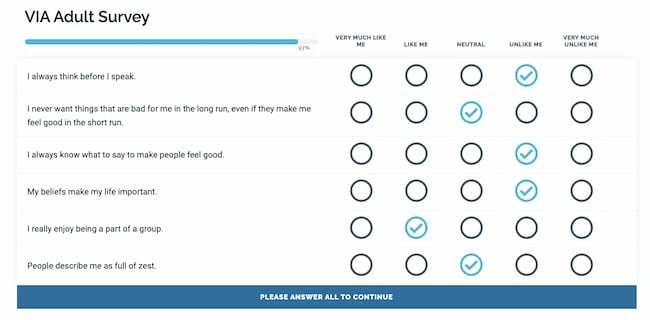
Best for: Learning your personality strengths and how you prioritize them.
For this test, you'll complete a series of questions ranging from "Very like me" to "Very unlike me." Like Meyers-Briggs tests, there is some repetition with slight rephrasing in the questions.
This free online test also included an extra survey, but it wasn't clear whether it connected to the results of the first quiz or not. Both surveys were interesting to complete and made me think about the meanings behind the words they used a little more carefully.
My results were a ranked list of qualities with a brief definition of each quality.
Pros: This test shows clear tracking for progress while completing the survey, which can make the process more fun and less stressful. The test questions themselves are also super interesting.
For the results, it was helpful to have an at-a-glance picture of which character aspects are a priority, and which were less valued.
Cons: The process of completing this test was somewhat more illuminating than reviewing the results.
10. Sociotype
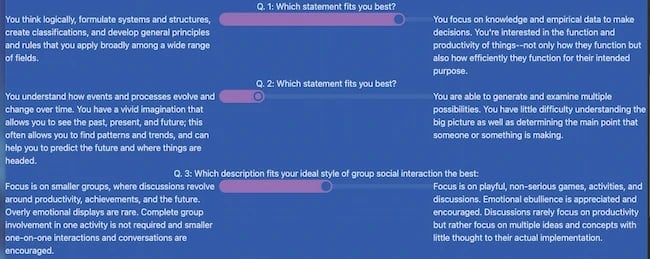
Best for: Anyone who’s already taken other popular tests and is looking for a new personality test for self-awareness.
To take this test, you'll place your answer on a scale between two conflicting perspectives. For example, "I am often unaware of what is going on around me" vs. "I am often unaware of hidden associations or connections."
The phrasing of the questions feels unique. It forced me out of my comfort zone, which made me more interested to complete it and more interested in my potential results.
Personality testing like this may ask you to take a deeper look into yourself — it inspired me to ask myself questions I usually put off. The definitions and result details may take extra time to review because they don't connect to other more familiar test definitions or groupings.
Pros: This test offers a deep dive into your personality and offers interesting ideas about how you choose and process information. This leads to unique insights and a springboard for further self-study.
Cons: The results were difficult to skim and the writing style for results isn't quick to scan or process. If you're looking for a lightweight or quick and easy-to-understand personality test, this is not it.
11. Verywell Mind
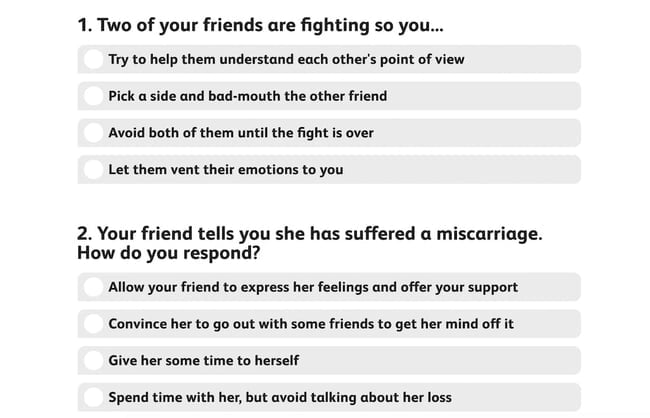
Best for: A speedy gut-check on how emotionally intelligent you are, with resources to further your understanding.
If you don't have the time for anything more in-depth, this test only asks you 10 quick questions before delivering your results.
It's admittedly not medical or scientific by any means, but does offer other articles depending on your score. If you score low, for example, VeryWellMind.com includes a link to another one of their articles, "Emotions and Types of Emotional Responses."
Pros: Takes only a few minutes to complete, and the questions are straightforward and easy to answer.
Cons: It's easy and fun, but isn't necessarily as accurate or scientific as the others in this list.
12. Empathy Quotient
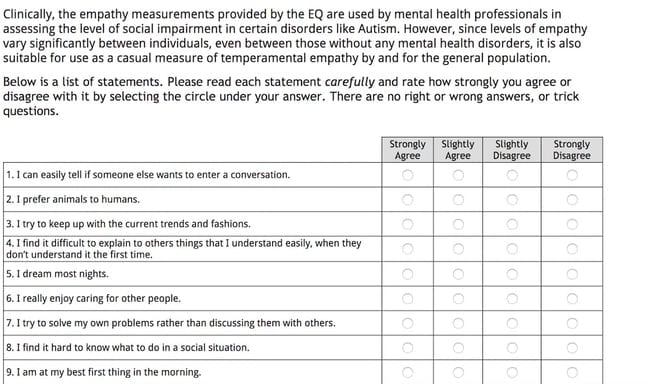
Best for: A more in-depth test to accurately analyze how emotionally intelligent you are.
Unlike the tests above, this one is designed to clinically assess you — the test was developed by Simon Baron-Cohen at the Autism Research Center at the University of Cambridge, and uses the same emotional measurements mental health professionals use to diagnose social impairment.
It's a 60-item questionnaire and is suitable to measure "temperamental empathy" in adults.
Pros: It uses the same measurements that mental health professionals use to diagnose social impairments — meaning it's accurate and scientifically-backed, and should provide you with a deeper understanding of your own empathy (and areas for improvement).
Cons: The test requires you to have a certain level of self-awareness and understand how others' perceive you. For instance, one statement is, "I am very blunt, which some people take to be rudeness, even though this is unintentional" — it might be difficult for someone to know whether their bluntness comes across as rudeness.
Free Personality Tests for Jobs
You may also be looking for a personality test for career preparation or job searching. Employers also may use these tests to learn your character traits or to assess your potential for success.
If you're looking for personality tests for jobs, check out the free tests below.
13. Human Metrics
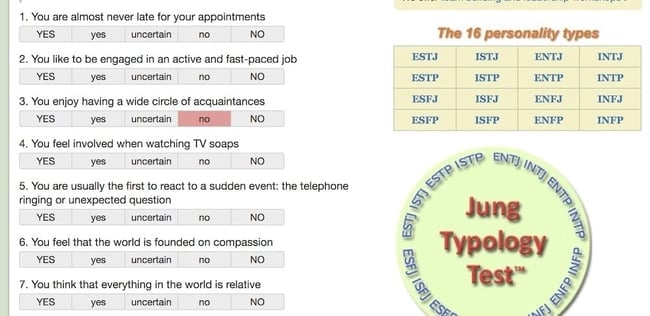
Best for: Determining a career path that is most well-suited for your personality.
If you've ever wondered which famous personalities share your personality type, you're in luck — Human Metrics shows you that information, along with your four-letter personality type (again, based on Jung and Myers-Briggs theories).
With this test, you'll get information about which career paths are most suitable for your personality type. If you're having trouble choosing a career path or doubting the one you've chosen, maybe this test can help you figure it out.

50+ Remote Team-Building Ideas
Tips, tricks, and templates to help you master team-building in the age of the remote workforce.
- Boost team morale
- Ice breaker games
- Activity proposal template
- And More!
Pros: This specific test allows you to see all 64 questions on one screen, which makes it easier to scroll back and change an answer if you'd like to.
Cons: Many of these responses can feel situation-dependent. "You feel involved when watching TV soaps", for instance, could depend on the show you're watching, how you're feeling that day (relaxed? overwhelmed?) and simply might not be a strong predictor of who you are as a person.
14. Crystal
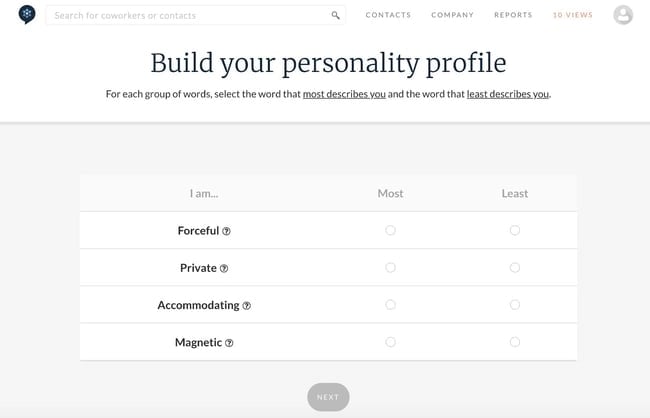
Best for: Learning how your personality biases you towards colleagues' behavior, and gaining a deeper understanding of your coworkers' personalities.
Crystal provides a free DISC assessment, which tells you (among other things) how your personality fits into your work environment, who you work well with, who you might have conflict with, how you perceive others’ behaviors, and how others perceive yours.
The test helps you understand how your own personality biases you towards certain colleagues (as in your personality might take another coworker's comments offensively, while the coworker just believes in being direct), which could strengthen your work relationships.
Best of all, Crystal also offers an accurate personality test, enabling you to build an extensive personality profile on one website. Plus, when you input your company, Crystal lets you see your colleague's personality profiles — undeniably critical information when you're looking to empathize with a coworker.
Pros: Can be a useful tool for finding areas to focus on for professional development and coaching.
Cons: There has been no correlational study to show that test results match real-world job performance.
15. CareerHunter
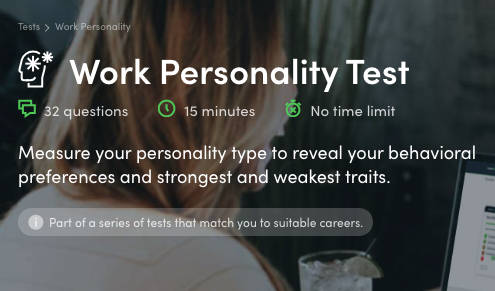
Best for: Determining how your personality and character ethic fit into the world of work.
CareerHunter’s Work Personality Test is designed to reveal your behavioral preferences and strongest and weakest traits, and how these align with the workplace.
It comprises 290 statements describing various thoughts, behaviors, feelings and attitudes relating to the world of work, such as “I like coordinating the work of others” and “I feel comfortable expressing my thoughts openly”. These statements are presented in groups of five, which are ranked according to their relevance to you, and your answers are then scored against 29 personality traits to provide insights into how you prefer to work.
CareerHunter’s scientifically validated testing suite features five additional assessments which, when taken together, accurately match you to the careers that best complement your interests, personality, motivations and aptitudes.
Pros: The interactive test is easy to use and features drag-and-drop functionality to rank your preferences. It also comes with a detailed 14-page report that compiles your top 5 strongest traits.
Cons: If you want a more in-depth analysis of your results, you’ll need to buy full access, which includes a 35-page report of all traits measured in the test, as well as 2 free test retakes to regenerate your results at any stage.
16. HEXACO
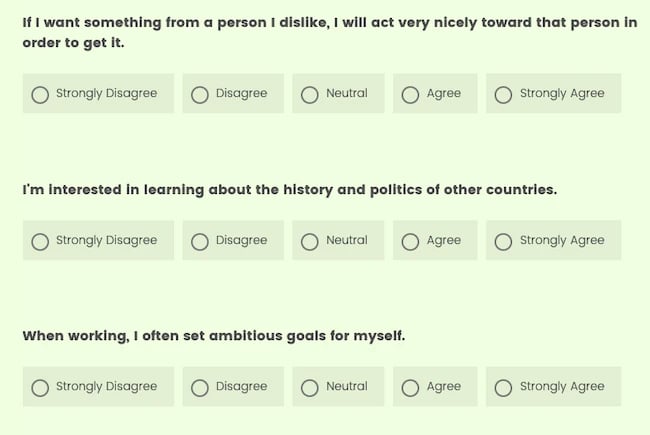
Best for: An academic perspective on your personality traits.
This free personality test offers a wide range of interesting questions and is sometimes used by employers during the hiring process.
From the start, it sets the tone for a different type of personality test. The introduction and disclaimer make it clear that this test isn't just for fun. It's providing information for further research, whether by you or the scientists conducting this test.
Similarly, the results feel more academic. They emphasize that the scales used to measure scores in areas from patience to creativity are in comparison to the average respondent.
Keep in mind, most scores come from Canadian University students. So, your results may not be an accurate comparison to your peers, depending on where you're from.
Pros: This test has interesting questions and offers a useful scale for understanding yourself.
Cons: The results are not as direct and easy to understand as some other tests. It's a good reminder that a personality test is a snapshot of your ideas, feelings, and perceptions at a given time, not a benchmark that will stay the same forever.
17. The IPIP-NEO
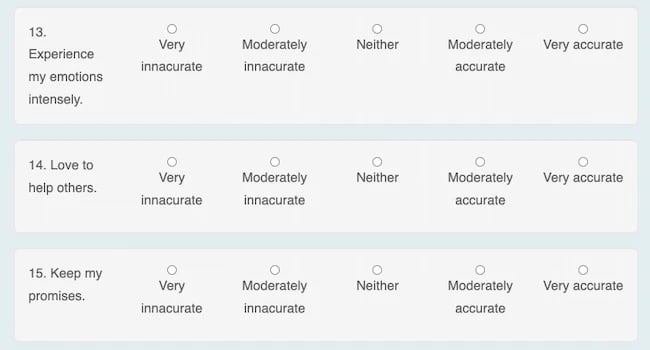
Best for: Getting a general understanding of how your personality type aligns with others your age.
This is another personality test that's often used by employers during the hiring process. Ratings for each question from "Very Inaccurate" to "Very Accurate." This is a common test format, but it can feel frustrating as you take the test, especially for questions where your response may depend on context.
The IPIP-NEO offers extensive explanations for what each section of the test means and how it interprets results. The combination of numeric scores and written explanations was easy to understand. But the language this test uses to explain results felt a little more strict or extreme than other similar tests.
Pros: This test compares your results to other people in the same age bracket, which may lead to more interesting results than other similar tests.
Cons: Score summaries are brief, broad, and general. This makes them feel a little less helpful, but easy to understand and process.
18. Eysenck’s Personality Inventory

Best for: Preparing for potential employment personality testing.
This test is super simple and quick. It's a yes or no test that splits results across four major temperament factors: stable, neurotic, extrovert, and introvert.
It also offers a helpful graphic for viewing your results type in comparison with other types.
Pros: This test is simple, straightforward, and quick to complete. So, if you want to get a sense of your personality test results before completing a test for a potential employer, this is a good place to start.
Cons: The analysis is quite general, and uses broad terms to define different personalities with positive and negative qualities.
19. 123Test
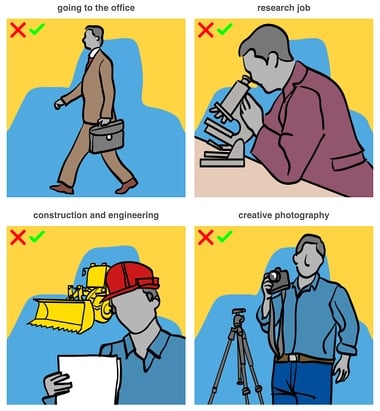
Best for: Analyzing and improving your relationships with coworkers.
123Test offers a DISC personality test you can take in five minutes, so there's really no excuses. You'll get a score to find out which DISC factors predict your behaviors toward other people.
The test offers critical information for understanding why you might get along better with one employee, and have more conflict with another. It identifies how you perceive other people's actions (as in "You're sensitive to her blunt nature, even though she believes she's just being straightforward"), which can help you improve work relationships.
Pros: It's incredibly quick and straightforward, and will give you a general sense of how you could misinterpret colleagues' behaviors.
Cons: With a few simple images, this test is less advanced than others in the list, and could offer different results every time you take it depending on your mood.
20. Truity Career Personality Profiler
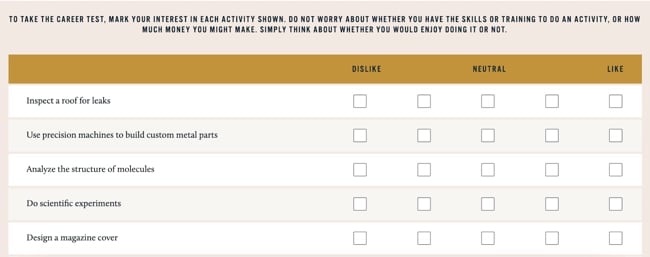
Best for: Figuring out an ideal career path, and learning which skills are required to excel in that career.
This test, based on the Holland Code and Big Five theories, will analyze your interests and personality traits and tell you about careers (and college majors) that are a good match for you. It also lets you know about specific tasks and projects you'd love, what motivates you, and provides advice to help you maximize your strengths.
Even if you're happy with your current career track, the test offers suggestions for specific skills you could learn to get ahead in your career.
Pros: If you're early in your career (or a college student), this is a good test for uncovering your interests and discovering potential career paths. Best of all, it lets you know which projects or tasks you'd enjoy — allowing you to mix and match and choose the ideal career based on your personal interests.
Cons: It can be difficult to know what you'd enjoy doing if you've never done it. For instance, as a college student, I might not know how to answer whether I'd enjoy designing a magazine cover if I've never experienced design work.
21. Sokanu
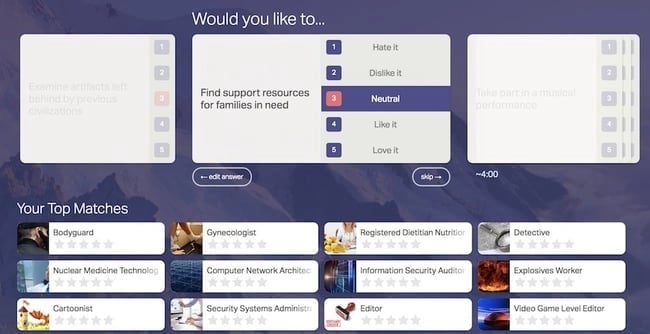
Best for: Determining a few different career paths that could make you happy — and then having the opportunity to pick-and-choose from there.
Major companies including General Assembly, NYU, and Redfin use Sokanu, a career assessment tool that tests you on your personality, background, interests, and goals to choose an ideal career path.
After you take the test, it provides you with multiple matches, which you can sort through to explore different careers and workplaces before choosing an ideal match.
Pros: The test gives you multiple options for careers that could fulfill you — which I appreciate, since it can be stressful to get to the end of a test and find out there's only one job that would make you happy. Plus, Sokanu offers a library filled with over 1,000 careers, and explains what type of people thrive in them — and why.
Cons: If you don't know much about what interests you professionally, it can be a difficult test to take. Question one, for instance, is "Would you like to... Advise organizations on how to meet their business goals?" As a high school student, I wouldn't have any idea how to answer that question.
.png)
Free Leadership Lessons Guide
Actionable leadership advice from HubSpot's Co-Founder, Dharmesh Shah.
- Qualities of Confident People
- Leading By Example
- Recognizing Excellence
- And More!
Free Personality Tests: FAQs
How accurate are personality tests?
Unfortunately, there isn't a personality test that is completely accurate. The validity of the Myers-Briggs Type Indicator and the DISC assessment have been called into question by behavioral scientists over the years due to their oversimplification of behavior and personality traits.
Emotional intelligence tests are also divisive among scientists due to the potential for bias against groups outside the norm since one's emotional recognition and regulation often depend on their cultural background.
That said, personality tests can be valuable tools for understanding personality similarities and differences among members of the same organization.
How reliable are personality tests?
Besides the quality of the test, the accuracy and reliability of personality tests also depend on other factors, like how truthful your responses are. While personality testing can offer valuable insights, they aren't flawless. Instead, look at personality tests as a useful tool to understand your personality.
A personality test can only be as accurate and reliable as the test and responses are. If personality testing is being used for something important, like employment, results should be interpreted alongside other relevant information.
What are personality tests used for?
Personality tests are often useful for:
- Career development
- Team building
- Self-discovery
- Relationship-building
They help individuals understand their strengths, weaknesses, and preferences. With this knowledge, you can make informed decisions about your personal and professional life more easily.
How to pass personality tests for jobs?
If you're taking a personality test for a potential job, it's important to be authentic and answer honestly.
There is no fixed "passing" score or desired personality type for these tests. Instead, employers are often looking for a better understanding of your personality and motivations, as well as how you might align with other members of the team.
If you're nervous about this part of the job search process, you may want to take a personality test or two in advance.
How should you prepare for a personality test?
If you want to prepare for a personality test, get to know the test format and common question types. Think about your personality traits and values, then consider how they may overlap with the desired traits for the job or situation.
That said, it’s important to be authentic and honest in your responses. Faking your responses is more likely to result in muddled results or a retest than a positive outcome.
What should you remember while taking personality tests?
As you complete the personality test, stay focused. Read each question carefully and consider each response carefully.
As mentioned above, be sure to answer truthfully, based on your own behaviors and feelings. Avoid trying to provide "correct" answers or guessing what someone may want to hear.
Why are personality tests important?
Personality tests give individuals and organizations a chance to understand behavioral tendencies and motivations.
They can help you or your employer find potential areas for growth and development. These tests can also help you boost self-awareness, build relationships, and make decisions.
Take a quick personality test today for personal and professional growth.
A personality test is a chance for discovery. It's a way to satisfy your curiosity about yourself and how others you care about may see you. So, take a few minutes to try one of the tests above. Don't miss out on the opportunity to better understand yourself and unlock your full potential.
Editor's note: This post was originally published in May 2018 and has been updated for comprehensiveness.

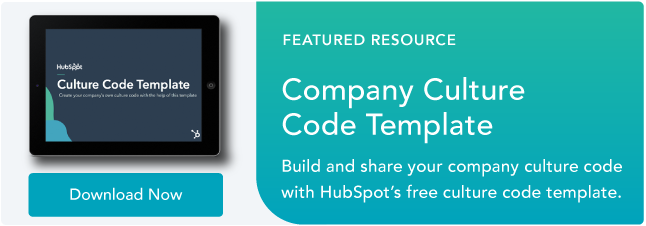
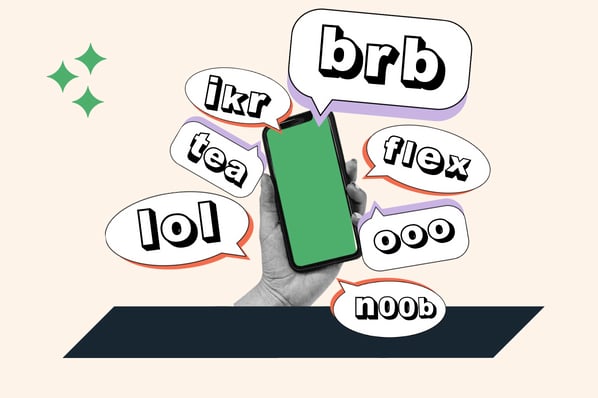


![How Neuromarketing Can Revolutionize the Marketing Industry [+Examples]](https://blog.hubspot.com/hubfs/neuromarketing_1.webp)
